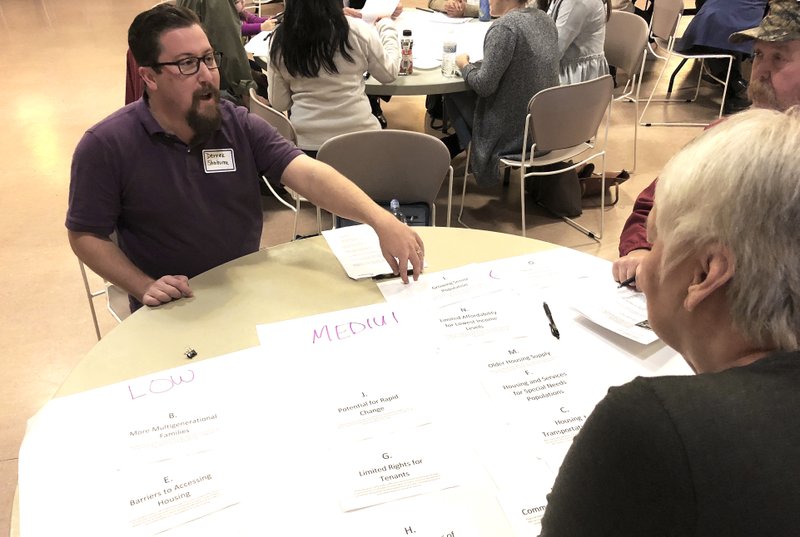FAYETTEVILLE -- Solving a city's housing issues goes beyond data and metrics, and residents are the ones who know best about their communities, participants heard in a workshop held Thursday at the Fayetteville Senior Center.
Enterprise Community Partners in Washington asked about 50 residents what they thought are the biggest housing issues facing the city. The workshop was part of a second series of public engagement events to gather recommendations for a report to be released after the end of the year. The Walton Family Foundation paid for the consultants to lead the project, partnering with the Northwest Arkansas Regional Planning Commission and Sam M. Walton College of Business at the University of Arkansas.
The first phase of public input happened in June and dealt with identifying the common concerns among residents. Stronger tenant rights, location and size of homes, people experiencing homelessness and community re-entry all made the list.
Thursday's groups were tasked with prioritizing key issues gathered from the previous round of input. Topics ranged from housing for seniors to government policies.
Springdale, Rogers and Bentonville all had workshops this week, with the last one in Fayetteville.
Susan Hartmann, program director for Enterprise, said the nonprofit group could simply do its own research and turn in a report for cities to do with what they want. But it's the community involvement that gives the numbers meaning, she said.
"It doesn't take long to learn that people in Fayetteville have a lot of pride, are very intelligent and really care about these issues," Hartmann said. "I don't think you want to be told by a bunch of outside consultants what to do."
The goal is to have housing costs not exceed 30 percent of a family's income, said Laura Searfoss, program officer with Enterprise. Housing plus transportation cost should not exceed 45 percent of income, she said.
In Fayetteville, average housing and transportation cost combined is around 46 percent of a typical family's income, Searfoss said.
"While it is one of the lower H and T costs within the region, it's still not necessarily affordable," she said. "You can't necessarily rely on transportation to help offset the cost of housing."
The groups were asked to pick the top three housing issues in the city. The need for more diverse housing options had the most consensus. The preponderance of three-bedroom, single-family homes will not meet the varied needs of residents, participants said.
Limited affordability for families of the lowest income levels also gained agreement among the groups. The city lacks rental properties, rent is on the rise and it's difficult for workers to find homes aligning with their earnings, participants said.
Priority for other issues varied, from older housing supply to barriers for accessing housing and the rapid change associated with the region's growth.
Renay Treat, a teacher, was in a group with five others and said housing often is a result of deeper issues.
"I think we've got to look at education, and how that's going to affect wages, which in turn changes expectations," she said. "We've got to meet expectations of what we can afford."
Kathleen Everitt, executive director of Real Estate Investors of Northwest Arkansas, said she felt community resistance to higher density housing and new projects drives many of the other challenges noted in the workshop.
A 15-year resident of the city, Everitt described the housing market landscape as a roller coaster ride.
"We just can't build fast enough to accommodate the growth that we're experiencing," she said.
NW News on 10/19/2018

